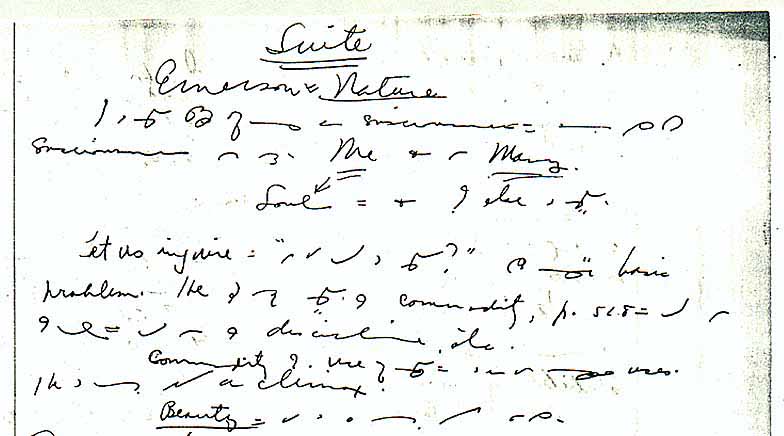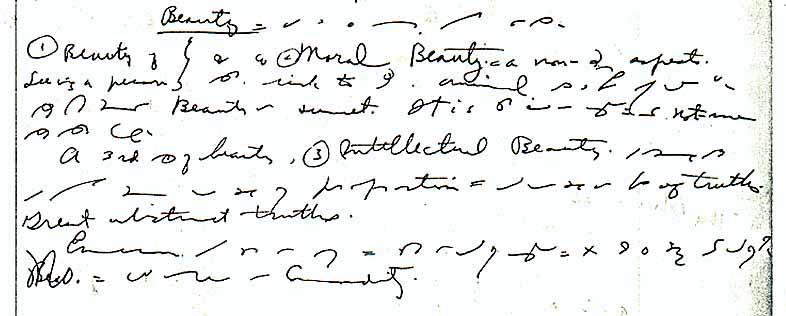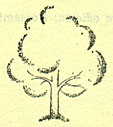a publication of the National Court Reporters Association, and is reprinted on raintreecounty.com with their permission.
Unlocking the Lockridge Diaries
Sometime in early 1992 I got a phone
call from retired reporter Morris Miller of Westbury, N.Y., asking
if I'd be willing to try to decipher the notes of a deceased
Gregg writer. As he now remembers, it was Arlene Stock, editor
of The Transcript, who had recommended him. "I could
never have transcribed those notes," he told me. But, perhaps
remembering the "Other People's Notes" articles I'd
written for the National Shorthand Reporter back in the '70s,
he thought I might be interested.
I told Morris I really wasn't;
that I was too busy in my "retirement."
Would I at least talk to
the man who wanted the job done, Laurence (Larry) Lockridge,
professor of Romantic literature at New York University? I agreed,
saying I might be able to find somebody else for him.
Dr. Lockridge is a persuasive
talker. He told me he was writing a biography of his father,
Ross Lockridge Jr., whose tragic death came shortly after the
publication of his best-selling novel Raintree County.
I agreed to take a look at the notes - and I was hooked.
The elder Lockridge had
left a number of papers - journals, notebooks, random notes -
all written in Gregg shorthand, the version we call pre-Anniversary.
Like most Gregg reporters, I myself write Anniversary, though
I'm familiar with the earlier, shorter system. (Each new version
was longer than the one before.) Martin J. Dupraw, a national
speed contest champion back in the '20s, uses pre-Anniversary
in his freelance reporting in White Plains, N.Y., where he's
much in demand by the lawyers.
By the way, Martin called
me while this article was in preparation. I'd written to ask
him if he minded my mentioning his age. "Not at all,"
he said. "In fact, today is my 89th birthday. I may be the
oldest active reporter in the country. I work every day, though
I no longer take all-day depositions. Half a day is enough. When
I'm not writing shorthand I'm banging out transcript on my trusty
manual typewriter."
Ross Lockridge's shorthand
wasn't half bad; better, in fact, than notes written by a couple
of the deceased reporters whose cases I had transcribed. But
it was full of atrocious longhand. (Names weren't too much of
a problem. Many of them Dr. Lockridge recognized and spelled
out for me when he sent me a batch of notes.) For a long time
one outline of frequent occurrence had me stumped. I looked at
it from all angles, even upside down. Finally context told me
it was a longhand of! And it's such an easy word to write
in Gregg. (Apparently the writer didn't trust his shorthand on
some short words; but and she were two others I
remember his writing in longhand.)

I suppose
we all develop quirks in our shorthand, especially when years
elapse after we've learned theory. One I hadn't met before: In
forming plurals, the writer often doubled up on his s's. For
example, the plural of cat he probably would have spelled kats(e)s.
Next to good notes, I suppose
context is the transcriber's best friend. And repetition can
be a wonderful help. (In a court case, an impenetrable passage
on direct can come clean when attacked on cross and redirect
examination.) There was very little contextual help and almost
no repetition in these mostly brief entries.
Actually, my main problem
was the dimness of the notes. I fussed over the fact that I didn't
have the original notes, which I assumed would be much easier
to read. But Dr. Lockridge didn't want to trust them to the mails.
And besides, he wrote me later, "You would have had much
rougher going with the originals, even with a magnifying glass!
These pencil jottings are so very dim and small that your eyes
would have given out. The Xerox machine that I used both enlarged
the passages and made them considerably darker. I know that any
photographic transfer in theory loses some data - but in some
instances it was difficult to see that there were any pencil
markings at all until the Xerox disclosed them."
Unquestionably, this type
of transcription is a real challenge, fraught with frustration.
There are no answers in the back of the book. Sometimes all that
kept me going was that Dr. Lockridge seemed satisfied with what
I turned out - even if I wasn't. I remember how cheered I was
one day to discover a page of beautiful-looking shorthand (no
longhand) from a notebook. It proved to be two or three verses
of an old song! ("I'll Take You Home Again, Kathleen,"
I believe it was.)
Many of the diary entries
were of recorded dreams. Sometimes a friend would ask, "Any
sexy stuff?" I'd retort, "What would you expect: a
young man's dreams?" (I found myself thinking how embarrassed
the poor man would have been had he caught me peering into his
dreams.)
For the benefit of others
who might venture into this field, I'll mention our financial
arrangements. The client should be told that this kind of transcription
commands a premium fee, and well it should. On most similar projects
I'd previously undertaken I charged by the page. I didn't expect
to make any money at it; I did it more as a favor to the judicial
system. (In cases for the Middlesex County [Massachusetts] Superior
Court I charged twice the statutory page rate - the transcription
was so slow going that I doubt if I netted more than 25 cents
an hour for my labors.) Dr. Lockridge and I agreed that an hourly
rate would be best. I suggested $10. "No," he said,
"I refuse to pay anything less than $25." I let him
talk me into it, and I ended up with a tidy sum - $1,400, as
I remember.
Finally I had the job done
except for one last batch of notes. It showed up on January 21,
1993, a few minutes after I arrived home from the Boston hospital
where I'd had surgery for lung cancer, with about a third of
my right lung removed. (As a lifelong nonsmoker, I still think
Nature played a dirty trick on me.) "Let's finish up the
job," I told my husband. I pored over the notes, rewrote
them in my own shorthand, then dictated to him as he keyed in
the sentences on the computer. I tell this not to show how noble
I am - I welcomed the distraction to keep from thinking about
my discomfort.
One of the first things I did on embarking on this project was to check out Raintree County from the library, the book hailed by some as The Great American Novel. I had two reasons for reading it: first, as a matter of interest; second, in the hope it would give me some insight into Ross Lockridge the man, perhaps even provide a key to help me unlock his very private writings. It didn't, except to confirm my observations that he was a fine writer, and a poet. The size of the book 1,060 pages - intimidated me at first. Some of it went rather slowly, but the last third I couldn't read fast enough. Last year Penguin Books published a new edition of the book, which is now in a second printing. (Incidentally, in 1957 the movie "Raintree County" came out, starring among others Elizabeth Taylor, Montgomery Clift and Lee Marvin. It did not meet with universal acclaim.)

Larry
Lockridge's own book, Shade of the Raintree, subtitled
The Life and Death of Ross Lockridge Jr., came out in hardcover
in April 1994 (Viking Penguin. $27.95). The author tells me that
a paperback edition will be in bookstores in November 1995.
The reviews of the biography
that I saw were good. In fact, Larry Lockridge says that the
reviews have been almost universally enthusiastic: "Viking
Penguin tells me they haven't had a book on their list so positively
reviewed in years. Still not a negative review." The Boston
Globe said it "is destined to become an American classic."
I probably wouldn't qualify
as impartial, but I found Shade of the Raintree fascinating.
It proves that Ross Lockridge wasn't the only writer in the family.
The son brings the father to life. I strongly recommend this
gripping biography.
Ross Lockridge died in 1948,
the year of his book's publication. Larry Lockridge told me at
the outset that his father had tragically died at a very young
age, but not until I read the biography did I know what had actually
happened.
Sometime in the late evening
of March 6, 1948, at his home in Bloomington, Ind., as he sat
in his car in the garage, having attached a vacuum cleaner hose
to the exhaust, Ross Lockridge turned on the engine and suffocated
from the fumes. He was only 33.
What motivated the tragedy?
Larry Lockridge chronicles the early life of this gifted young
man, who seemed to have everything going for him. He had written
a blockbuster of a book - with more books to come, presumably.
He was brilliant, handsome, a devoted husband to his beautiful
wife, a loving father to his four equally beautiful children.
The biography contains a number of pictures; the most appealing
of them, a photo of the young family, appears on the dust jacket.
(Larry, the younger of the two sons, was five at the time of
his father's death.)
As to exactly what went
wrong, most of the problems came with getting Raintree County
into print and difficulties that arose shortly thereafter. The
author had been in a state of clinical depression even before
the book came out, and quarrels with the Book of the Month Club
and a contract dispute with his publisher, Houghton Mifflin,
over splitting up award money from a Metro Goldwyn Mayer contest
exacerbated the situation - and his depression. The author wasn't
happy over some cuts made in the book and the rewriting he had
to do. When the book finally came out, some of the reviews were
unfavorable; this he took very hard. He had money problems, and
there was pressure on him to start another book. He became ill
and more and more depressed. Larry Lockridge wrote in Shade
of the Raintree, "He wasn't depressed because he couldn't
get a second novel going; rather, he couldn't get a second novel
going because he was depressed."
It's hard to avoid the conclusion
that the book killed the author. The news of Ross Lockridge's
suicide "came simultaneously with the Herald Tribune's announcement
that Raintree County was now the number one national bestseller,"
the son wrote in Shade of the Raintree.
Getting back to the shorthand
and my contribution, it was interesting to me to see which passages
I'd labored over found their way into the biography. In one of
them, probably written shortly before the suicide, Ross Lockridge
wrote, "One might as well speak out, and bravely, about
one's book and other things - one cannot possibly commit any
graver errors than one has already imagined."
In his "Notes and Acknowledgments"
in the biography, Larry Lockridge wrote that he was much indebted
to me. "[She] was able to decode a good percentage of my
father's shorthand in various manuscripts and book margins."
Earlier in the book, with
no names mentioned, he wrote, "[My father] was a state champ
at Gregg shorthand, the obsolete 1919 version. His use of it
became idiosyncratic over the years. I had to round up a world-class
decoder to recover some dreams, notes, and marginalia."
How 'bout that?

| The Novel | Essays | Other Writings | RL Jr. Writer's Award | Complete Contents | Book Orders |
| The Biography | Photos / Postcards | RC Source & Facsimiles | Suicide & Prevention | Movie & Score |
May 2009